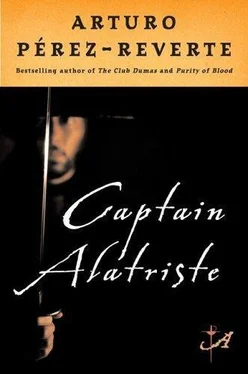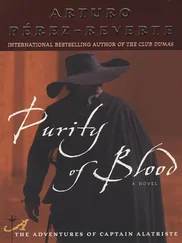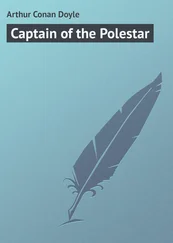Arturo Perez-Reverte - Captain Alatriste
Здесь есть возможность читать онлайн «Arturo Perez-Reverte - Captain Alatriste» весь текст электронной книги совершенно бесплатно (целиком полную версию без сокращений). В некоторых случаях можно слушать аудио, скачать через торрент в формате fb2 и присутствует краткое содержание. Жанр: Старинная литература, на английском языке. Описание произведения, (предисловие) а так же отзывы посетителей доступны на портале библиотеки ЛибКат.
- Название:Captain Alatriste
- Автор:
- Жанр:
- Год:неизвестен
- ISBN:нет данных
- Рейтинг книги:3 / 5. Голосов: 1
-
Избранное:Добавить в избранное
- Отзывы:
-
Ваша оценка:
- 60
- 1
- 2
- 3
- 4
- 5
Captain Alatriste: краткое содержание, описание и аннотация
Предлагаем к чтению аннотацию, описание, краткое содержание или предисловие (зависит от того, что написал сам автор книги «Captain Alatriste»). Если вы не нашли необходимую информацию о книге — напишите в комментариях, мы постараемся отыскать её.
Captain Alatriste — читать онлайн бесплатно полную книгу (весь текст) целиком
Ниже представлен текст книги, разбитый по страницам. Система сохранения места последней прочитанной страницы, позволяет с удобством читать онлайн бесплатно книгу «Captain Alatriste», без необходимости каждый раз заново искать на чём Вы остановились. Поставьте закладку, и сможете в любой момент перейти на страницу, на которой закончили чтение.
Интервал:
Закладка:
The smile he directed at me that morning when he found me waiting belonged to the first category: the one that lighted his eyes, refuting the imperturbable gravity of his face and the harshness he often intentionally gave to his words, even when he was far from feeling it. He looked up and down the street, appeared to be satisfied when he did not see any new creditor lurking about, walked toward me, removed his cape, despite the cold, and tossed it to me, wadded into a ball.
"Inigo," he said. "Boil this. It is crawling with bedbugs."
The cape stunk, as did he. His clothing held enough bugs to chew the ear off a bull, but all that was resolved less than an hour later in Mendo el Toscano's bathhouse. A native of Tuscany, the barber had been a soldier in Naples when only a lad, and he admired Diego Alatriste greatly, and trusted him. When I arrived with a change of clothing—the only other full outfit the captain kept in the battered old cupboard that served us as a clothespress—I found him standing in a wood tub overflowing with dirty water, drying himself. El Toscano had trimmed his beard for him, and the short, wet chestnut hair combed back and parted in the middle revealed a broad forehead tanned by the sun of the prison courtyard but marred by a small scar that ran down to his left eyebrow. As he finished drying and putting on the clean breeches and shirt, I observed other scars I was already familiar with. One in the shape of a half-moon between his navel and his left nipple. A long one that zigzagged down a thigh. Both had been made by a cutting blade, a sword or dagger, unlike a fourth on his back, which had formed the telltale star left by a musket ball. The fifth was the most recent, still not completely healed, the one that kept him from sleeping well every night: a violet gash almost a hand's breadth wide on his left side, a souvenir of the battle of Fleurus. It was months old, and at times it opened and oozed pus, although that day as its owner stepped out of the tub it did not look too bad.
I helped him as he dressed, slowly and carelessly: dark gray doublet and knee breeches of the same color, tight at the knees over the buskins that hid the ladders in his hose. Then he buckled on the leather belt that I had carefully oiled during his absence, and into it thrust the sword with the large quillons, whose blade and guard showed the nicks, knocks, and scratches of other days and other blades. It was a good sword, long, intimidating, and of the best Toledo steel, and as it was drawn or sheathed it gave off a long metallic sssssss that would give you gooseflesh. He studied his reflection in a dim half-length mirror for a moment, and smiled a weary smile.
" 'Sblood," he muttered, "I feel thirsty."
Without another word he preceded me down the stairs and along Calle Toledo toward the Tavern of the Turk. As he had no cloak, he walked along the sunny side, head high, with the frazzled red plume in the band of his hat dipping and waving. He touched his hand to the wide brim to greet some acquaintance, or swept the hat off as he passed a lady of a certain status. I followed, distracted, taking in everything: the urchins playing in the street, the vegetable vendors in the arcades, and the groups of gossiping idlers sitting in the sun beside the Jesuit church. Although I had never been overly innocent, and the months I had been living in the neighborhood had had the virtue of opening my eyes, I was still a young and curious pup who looked at the world with an astonished gaze, trying not to miss a single detail.
As for the carriage, all I noticed at first were the hoof-beats of a team of mules and the sound of wheels approaching behind us. I scarcely paid attention; seeing coaches and carriages was a normal occurrence, because the street was the principal route to the Plaza Mayor and the castle, the Alcazar Real. But when I looked up for an instant as the carriage caught up to us, I saw a door without a shield and, in the small window, the face of a girl with blond hair combed into corkscrew curls, and the bluest, clearest, and most unsettling eyes I have ever seen. Those eyes met mine for an instant, and then the enchanting creature was borne off down the street.
I shuddered, not knowing why. But my shudder would have been even stronger had I known that I had just been gazed upon by the Devil.
"We have no choice but to fight," said Don Francisco de Quevedo.
The table was littered with empty bottles, and every time that Don Francisco was a little too liberal with the wine of San Martin de Valdeiglesias—which happened frequently—he was ready to call out Christ himself.
Quevedo was slightly lame, a poet, a fancier of whores, nearsighted, and a Caballero de Santiago. He was as quick with his wit and his tongue as with his sword, and he was famous at court for his good poems and bad temper. The latter was, all too often, the cause for his wandering from exile to exile and prison to prison. It is well known that though, like all of Madrid, our good lord and king, Philip the Fourth, and his favored Conde de Olivares appreciated the poet's satiric verses, the king liked much less being the subject of them. So from time to time, after the appearance of some sonnet or anonymous poem in which everyone recognized the poet's hand, the magistrate's bailiffs and constables would swarm into the tavern, or Quevedo's domicile, or a place where friends met to exchange gossip, to invite him, respectfully, to accompany them, taking him out of circulation for a few days or months. As he was stubborn and proud, and never learned his lesson, these occurrences were numerous, and served to embitter him.
Quevedo was, nevertheless, an excellent table companion and a good friend to his friends, among whom he included Captain Alatriste. Both went often to the Tavern of the Turk, where they would gather their friends around one of the best tables, which Caridad la Lebrijana—who had been a whore and still was occasionally for the captain, though free of charge—usually reserved for them. That morning, along with Don Francisco and the captain, the group was completed by habitues: Licenciado Calzas, Juan Vicuna, Domine Perez, and El Tuerto Fadrique, the one-eyed apothecary at the Puerta Cerrada.
"No choice but to fight," the poet insisted.
He was, as I have said, visibly "illuminated" by a bottle or two of Valdeiglesias. He had jumped to his feet, overturning a taboret, and with his hand resting on the pommel of his sword, was sending blazing glances toward the occupants of a nearby table. There, two strangers, whose long swords and capes were hanging on the wall, had just congratulated the poet on a few verses. Unfortunately, those lines actually had been written by Luis de Gongora, Quevedo's most despised adversary in the Republic of Letters—a rival whom, among other insults, he accused of being a sodomite, a dog, and a Jew. The newcomers had spoken in good faith, or at least it seemed so, but Don Francisco was not disposed to overlook their words.
"I shall grease my poems with the fat of the pig So that gnat Gongora cannot chew off a piece. ..."
He began to improvise there on the spot, weaving a little, hand still clutching the hilt of his sword, while the strangers tried to apologize and the captain and his table companions held on to Don Francisco to keep him from drawing his sword and going for the offenders.
"But by God, that is an insult," the poet cried, trying to loose the right hand his friends were gripping so tightly, while with his free hand he adjusted his twisted eyeglasses. "A bit of steel will make things, hic , right."
"That is too much steel to squander so early in the day, Don Francisco," Diego Alatriste sensibly interceded.
"It seems very little to me." Without taking his eyes off his perceived tormentors, the poet ferociously smoothed his mustache. "But we will be generous: one hand's breadth of steel for each of these hijosdalgo, who are sons of something, no doubt, but very certainly not sons of hidalgos."
Читать дальшеИнтервал:
Закладка:
Похожие книги на «Captain Alatriste»
Представляем Вашему вниманию похожие книги на «Captain Alatriste» списком для выбора. Мы отобрали схожую по названию и смыслу литературу в надежде предоставить читателям больше вариантов отыскать новые, интересные, ещё непрочитанные произведения.
Обсуждение, отзывы о книге «Captain Alatriste» и просто собственные мнения читателей. Оставьте ваши комментарии, напишите, что Вы думаете о произведении, его смысле или главных героях. Укажите что конкретно понравилось, а что нет, и почему Вы так считаете.










